Tokyo 2020 Olympics: With one year to go what are the key stories to watch?
- Published
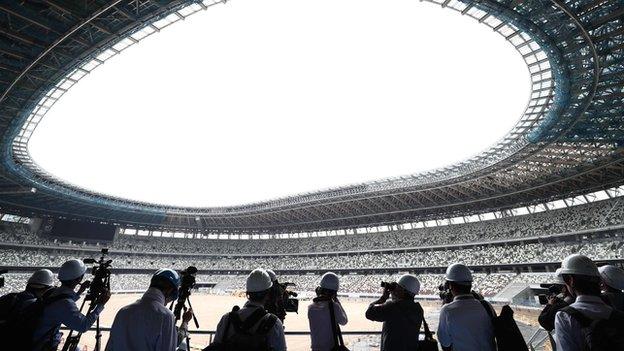
Media assess construction work at the Tokyo National Stadium earlier in July
In terms of both performances and controversy, Rio 2016 was arguably the most incident-packed and newsworthy Games in living memory. So how will Tokyo 2020 compare?
Pressure on Team GB
Not since 1996 in Atlanta has Team GB failed to win more medals than the previous Games. The remarkable second-place finish in the medal table at Rio 2016 firmly established Great Britain as a true sporting superpower. So the big question in Tokyo will be whether continuing such success is sustainable, or whether it is time for a correction after an era of over-performance.
Despite a haul of 67 medals in Rio, funding agency UK Sport has upped its target range to 54-92 for Tokyo and hopes to send the country's biggest ever team to an overseas Games. It is also bullish about the prospects of success, insisting current performances are matching those recorded a year out from Rio 2016.
However, in the three years that have passed since that triumph, UK Sport has seen confidence in its high-performance system shaken by a spate of athlete welfare scandals, and had to partially soften its 'no compromise' strategy after a rebellion from sports that suffered funding cuts. There has also been significant changes of leadership, with ex-chief executive Liz Nicholl stepping down, and Bill Sweeney, the former head of the British Olympic Association, leaving for the Rugby Football Union.
With the Russian team strengthened after being depleted in Rio by rafts of suspensions amid its doping scandal, hosts Japan hugely ambitious before their own Games, and China desperate to bounce back after finishing third, BOA and UK Sport insiders also accept the opposition will be tougher next year.
Team GB's surfers, skateboarders and softball players will hope to benefit from funding for the first time, and there has also been additional money for climbing and karate, the other new sports.
With the likes of Adam Peaty, Dina Asher-Smith and six-time champion Jason Kenny, who will have the chance to become Britain's most decorated Olympian outright in Tokyo, GB will once again have plenty of medal potential.
But it may not be enough to prevent the team dropping out of the top four in the table for the first time since Athens 2004.
More widely, with Olympic legends Usain Bolt and Michael Phelps both retiring after Rio, it will also be fascinating to discover who emerges from the next generation of stars.
And if New Zealand weightlifter Laurel Hubbard qualifies and becomes the first openly transgender athlete to compete in the Games, expect her to provide another intriguing and hugely controversial sub-plot.
Handling the heat
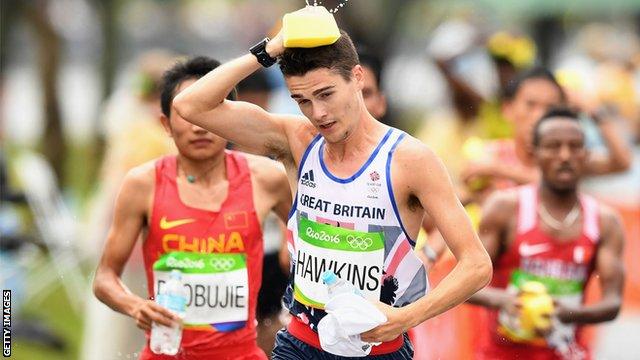
GB's Callum Hawkins collapsed from heat exhaustion during the Gold Coast 2018 Commonwealth Games marathon
Another challenge facing Team GB will be the risk of extreme conditions, with last year's heatwave in Japan causing the deaths of more than a hundred people as temperatures soared above 41C.
Despite the heavy rain in Tokyo this week as the city celebrates the year-to-go milestone, health experts have urged organisers to start the marathon before dawn, and additional shading and road-cooling measures are being planned.
But if there is any repeat of the scenes that marred the Gold Coast 2018 Commonwealth Games, when Scottish runner Callum Hawkins collapsed from heat exhaustion during the marathon, it is sure to lead to questions over the scheduling. Especially when the 1964 Tokyo Games was staged in October.
Ready, Steady, Tokyo
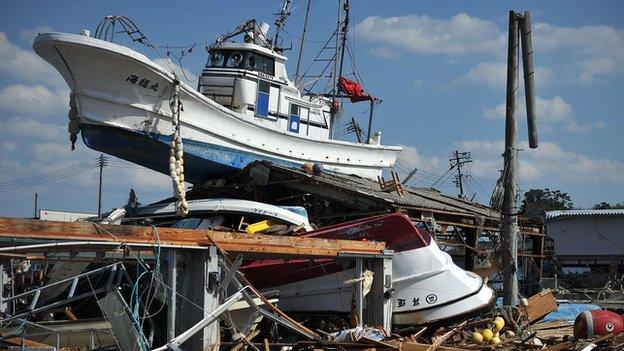
High temperatures are far from the only issue that could keep organisers awake at night. The city was meant to be a much more reliable choice for the IOC after the unprecedented chaos of Rio 2016, where political upheaval, economic recession, the Zika virus and worries over pollution and security marred the build-up, before the Russian doping scandal overshadowed the actual action. Despite plenty of iconic sporting moments in Rio, white elephant venues, and a continuing corruption scandal have since tainted the event's legacy.
However, Tokyo 2020 has not been without controversy of its own.
Over the next 12 months, as with all Games, there will be scrutiny of overall costs, venue construction, ticketing, security measures, legacy planning, traffic and public transportation measures, accommodation, test events, sustainability, public appetite, commercial revenue, and earthquake evacuation plans.
On several of these measures, the signs are encouraging. Organisers claim half of the eight new permanent venues are already completed and IOC president Thomas Bach has said he cannot recall a better prepared Games. A record number of local sponsorship deals have been signed and there has been exceptionally high demand for tickets with 3.2 million purchased. More than 200,000 people have also registered to be volunteers.
Fifty six years after Tokyo's first Olympics signalled Japan's recovery from the second World War, there will be much focus on the extent to which Tokyo 2020 lives up to organisers' claim that this will be the 'reconstruction Games' following the Tohoku disaster in 2011 when an earthquake and tsunami led to 19,000 deaths and a meltdown at the Fukushima nuclear power plant.
Baseball and softball matches will be held in the region, along with the start of the torch-relay, a clear attempt by the authorities to show that the region is now safe, despite lingering fears by some experts over radiation levels, and concern at the haste with which the government has ended evacuation orders, stopping subsidies for those affected.
Critics believe the billions being lavished on the Games would be better spent helping to re-house the hundreds of thousands forced from their homes by the catastrophe in the north-east of the country eight years ago.
Counting the cost
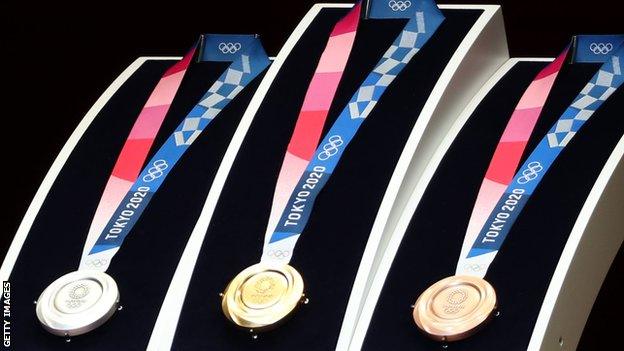
Over 90% of Japanese cities, towns and villages participated in the recycling drive to produce the medals
Billed by some as the most innovative and futuristic Games ever, there is much anticipation about the use of robot technology in Tokyo, and hopes that the event will improve accessibility for the city's rapidly ageing population. The extent to which new sports such as surfing, skateboarding and climbing appeal to the younger audience the IOC craves will also be another major theme.
But all this of course comes at a huge cost. While fears the budget could spiral completely out of control have been dampened after pressure from the IOC saw some cuts implemented, the £10bn set out in the most recent official figures is still about double what was originally estimated. Some forecasts predict the final bill will climb significantly higher, and there are concerns that tax-payers may be left to foot the bill for the renovation of the venues for years to come.
Anti-Games campaigners Hangorin No Kai (No Olympics 2020) have told the BBC that the event is "being exploited as an excuse to seize living spaces and public land from the poor and force through redevelopment."
They claim the business-friendly building projects linked to the Games have caused rents to soar and forced out independent shops, while the construction of the new national stadium has seen homeless people forcibly removed from parks and streets, and 230 households evicted from public housing buildings, including many elderly.
They also point to a recent report by an international trade union that concluded that the rights of workers building 2020 venues were being violated, and say that anti-terrorism legislation linked to the Games has impeded press freedom.
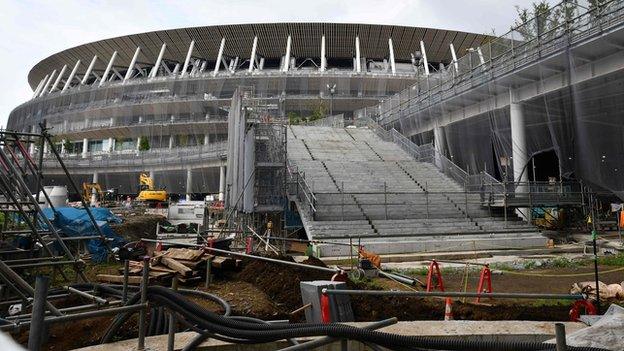
Construction work at Tokyo's national stadium
Corruption
The Olympics is no stranger to allegations of corruption, and Tokyo 2020 is proving no exception.
Tsunekazu Takeda, the former president of the Japanese Olympic Committee, resigned earlier this year amid claims of vote-buying linked to the city's successful bid to host the Games, which he also headed up.
Placed under formal investigation by French officials last year, the 71-year-old has denied wrongdoing over payments totalling £1.5m to a consultancy linked to the son of the disgraced former athletics supremo and IOC member Lamine Diack.
Diack and his son had also issued denials, but with both due to stand trial in Paris later this year on corruption and money laundering charges, and with the IOC already investigating allegations that nine of its members were bribed to vote for the Rio Games, the scandal has the potential to cause more embarrassment for the 2020 hosts and overshadow preparations.
Doping
Amid farcical scenes back in 2016, athletes arrived in Rio in limbo, unsure whether Russia would be banned for its remarkable doping scandal.
The IOC's hugely controversial decision to defy the World Anti-Doping Agency and allow the country to take part was seen as a devastating blow to clean sport, sparking bad blood between rival athletes, countries and within the sports community. Russia was eventually banned from last year's winter Games, with athletes cleared of doping forced to compete under a neutral flag.
Since then, the IOC ban has been lifted, Russia have been reinstated by Wada, a database from its Moscow lab has finally been handed over for analysis, and the crisis has eased considerably.
But the fall-out from the saga could still affect Tokyo. Russian track and field athletes remain banned by the IAAF, and their hopes of the sanction being lifted in time for Tokyo suffered a blow after the revelation that suspended coaches and a medic were still working with athletes.
The scandal has eroded some western athletes' trust in the authorities, with more now taking matters into their own hands.
Tensions could boil over in Japan, as they have done this week at swimming's world championships, where Britain's Duncan Scott and Australia's Mack Horton snubbed China's controversial Olympic champion Sun Yang, who has already served one doping suspension.
On the eve of Tokyo's year to go celebrations came a stark reminder of the cheating that has tainted the legacy of recent Games.
Uzbek freestyle wrestler Artur Taymazov becoming the 60th athlete (and seventh gold medallist) disqualified from London 2012 under a doping sample re-testing programme.
Convincing the world that what it is watching in Tokyo next year is real, and that the testing conducted at the Games is effective, may be the authorities' greatest challenge.
